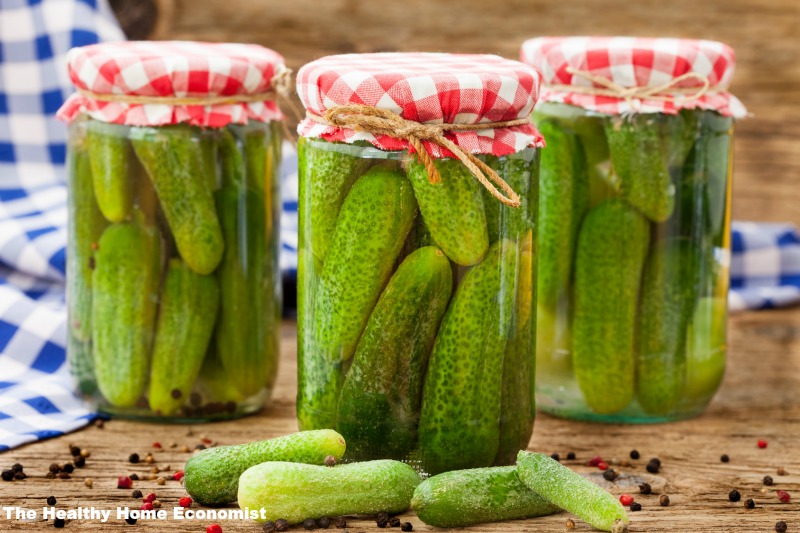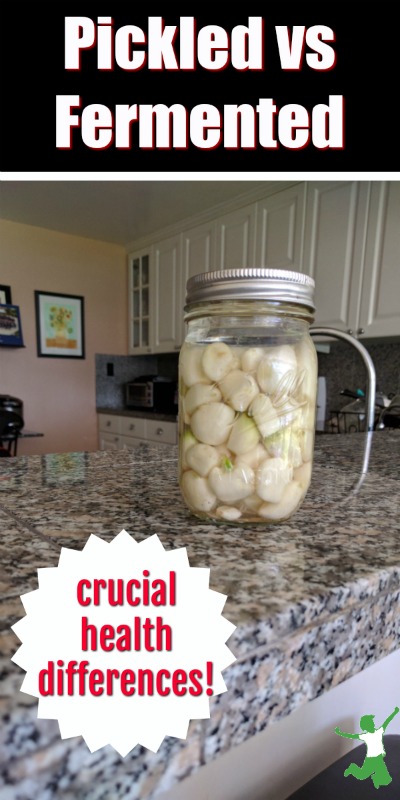The often overlooked differences between pickled and fermented foods. They are not necessarily the same nor do they offer the same benefits to health.
There seems to be a bit of confusion going around about fermented foods and the difference between what you make in your kitchen and the pickled versions that are available on the supermarket shelf. For example, in one of my video lessons, I demonstrate how to make sauerkraut in the traditional manner.
After the shredded cabbage ferments on the kitchen counter for a few days, it is then refrigerated or kept in a cool cellar where the sauerkraut remains naturally preserved for extended periods of time.
How does this homemade pickled cabbage compare to the pickled cabbage in a jar in the supermarket? What about pickled cucumbers or pickled garlic, also popular commercial choices?
Pickled vs Fermented Foods
Alex Lewin, author of Real Food Fermentation explains that the confusion comes from the overlap in definition. In a nutshell, not all fermented foods are pickled and not all pickles are fermented.
In other words, foods that are pickled are those that have been preserved in an acidic medium. In the case of various types of supermarket pickles on the shelf, the pickling comes from vinegar.
These vegetables, however, are not fermented (even though vinegar itself is the product of fermentation) and hence do not offer the probiotic and enzymatic value of homemade fermented vegetables.
Vegetables that you ferment in your kitchen using a starter, salt, and some filtered water create their own self-preserving, acidic liquid that is a by-product of the fermentation process. This lactic acid is incredibly beneficial to digestion when consumed along with the fermented vegetables or even when sipped alone as anyone on the GAPS Intro Diet has discovered (cabbage juice anyone?). In other words, homemade fermented veggies are both fermented and pickled.
Alcoholic Fermentation
What about alcoholic fermentation?
In the case of wine and unpasteurized beers, fermentation occurs as the result of certain yeasts converting sugars into alcohol but there is no pickling that takes place despite the common expression that a person who has had too much to drink is “pickled”.
4 Benefits of Culturing without Heat or Pressure
Home fermentation of vegetables preserves without the use of any pressure or heat unlike supermarket versions of the same foods. It allows the ubiquitous and beneficial lactobacilli present on the surface of all living things – yes, even your own skin – to proliferate creating lactic acid which not only pickles and preserves the vegetables, but also promotes the health of those that consume it in the following ways:
- Enhances the vitamin content of the food.
- Preserves and sometimes enhances the enzyme content of the food.
- Improves nutrient bio-availability in the body.
- Improves the digestibility of the food and even cooked foods that are consumed along with it!
Avoid Shelf Stable Pickled Foods
So don’t be fooled by unhealthy supermarket pickled versions of homemade fermented foods.
These modern foods are the product of high heat and pressure which destroys nutrients and does not in any way enhance health.
The one exception to this rule is the various fermented foods in the refrigerator section of many health food stores. These products are actually fermented and pickled. The only drawback is that these gourmet items are rather expensive compared to the pennies per ounce it costs to make them yourself.
If home fermentation is a kitchen goal that you are ready to tackle, there are plenty of fermented foods recipes on this blog to help get you started on this fun journey! If you prefer trying fermented beverages first, the provided link will take you to over two dozen recipes to consider.









Just out of curiosity…
My family has enjoyed Bubbies pickles. They say they have live cultures and are not made with vinegar, sugar or preservatives. They also make sauerkraut and make the same claims for it… Would Bubbies be a good store-bought choice?
Also, I do love Goldmine sauerkraut. Have not tried to make my own yet, but until I do… What do you think of Goldmine products?
Thanks 🙂
This is unrelated: but have a possible blog post idea? We just finished watching Bing Crosby and Rosemary Clooney’s White Christmas movie from 1954 in color. Three times in this movie they mention “Buttermilk with a Liverwurst Sandwich” for lunch and even show Rosemary Clooney asking for it and eating the sandwich drinking the buttermilk with it.
Would you know of any good liverwurst recipes? I went to look up some in my Joy of Cooking Cookbook and Nourishing Traditions Cookbook, but was surprised to not find any there. It seems like it was a popular American lunch (from German immigrants?).
That is interesting. We recently watched another 1945 movie called “Christmas in Connecticut”, in it one of the main characters was a soldier recuperating in a hospital. Unable to eat solid food at the time, his nurse brought him his meal, and when she lifted the lid, it was a bowl of milk with a raw egg in the middle!!!
This is great. Thanks!
Thank you
I’ve just learned recently that the goitrogen effect increases with fermentation- this would be with the fermented cabbage. So if you have thyroid issues, beware.
Eileen Shahzada What you bought is fine IF it was refrigerated. If it was not refrigerated, then it is not fermented even if the ingredients do not include vinegar.
Thanks for the article. I love fermented veggies especially. I lived in Korea for a while and they are quite fond of their fermented vegetables over there. I just started some radish kimchi going the other day.
Thanks for this! I asked my hubby this morning why he wasn’t healthy considering how much beer he drinks (since its fermented) sort of as a joke, but makes sense now!. I have been making fermented salsa for about 6 months (had some failed attempts with kefir) but he doesn’t like the taste of vinegar…any suggestions? Also- I love kraut but he’s not a fan. Is homemade fermented kind similar in taste to store bought? Thanks !!
i bought some saurkraut and it only said cabbage and salt so that would be fermented and pickled wouldn’t it since it doesn’t have vinegar added?
Was it in the refrigerator section? If it isn’t refrigerated it isn’t still living.
Sometimes it is pasteurized, that may not show up on the label.
Does vinegar interfere with certain medications? My Mom’s doctor told her not to take apple cider vinegar with her medications. My brother had two stents put into his main artery and the doctor told him not to use vinegar. One of my goals for 2013 is to start learning to ferment foods for better health and nutrition.